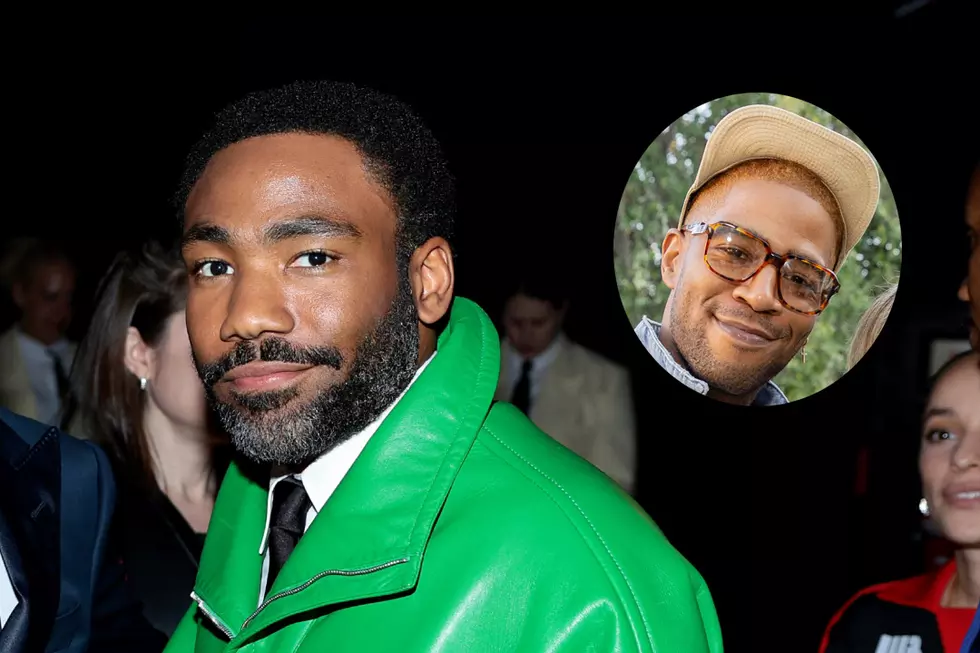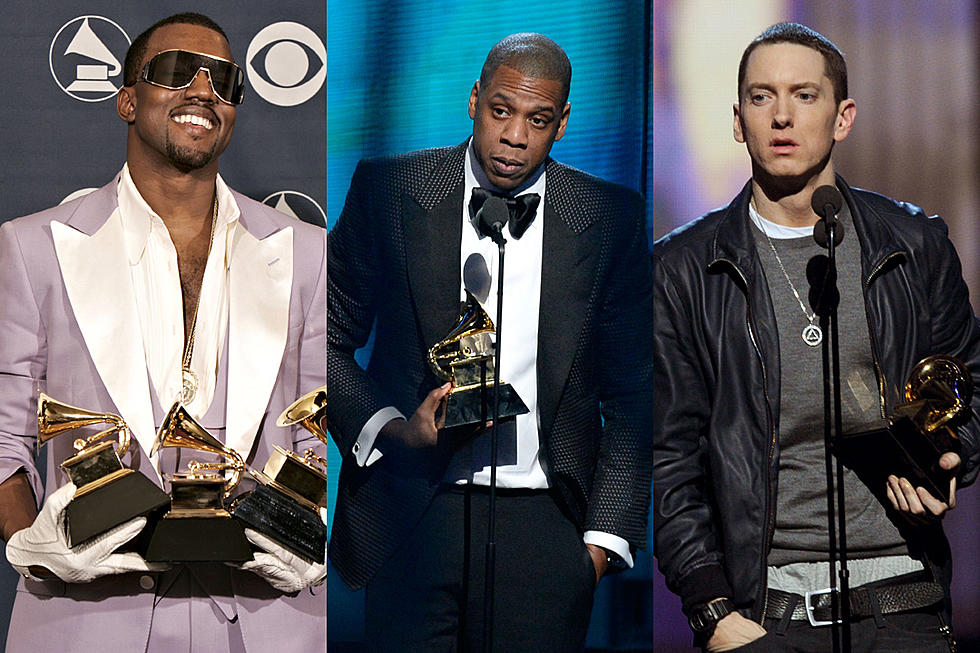![Donald Glover a.k.a Childish Gambino, “Strange Clouds” [Feature From the April 2012 Issue]](http://townsquare.media/site/812/files/2012/03/childishgambinofeature.jpg?w=980&q=75)
Donald Glover a.k.a Childish Gambino, “Strange Clouds” [Feature From the April 2012 Issue]
**THIS STORY APPEARS IN ITS ENTIRETY IN THE APRIL 2012 ISSUE OF XXL. ON SALE NOW!**
WORDS ADAM FLEISCHER (@AdamXXL)
It's a day of first appearances for Childish Gambino. He has just completed his first taping of The Late Show With David Letterman, where, following a performance of his new single single, “Heartbeat,” the 28-year-old entertainer was bid adieu by a paparazzi-induced flickering of cameras as he exited through a side door of Midtown Manhattan’s Ed Sullivan Theater and dashed towards a shimmering black SUV. The vehicle, packed tightly with Gambino’s sister and two-person PR team, is headed a few blocks away for Gambino’s second first appearance of the day, this one at BET’s 106 & Park on West 57th Street. “I’m more nervous about 106 & Park [than Letterman],” he says while cruising up the city’s west side. It’s a brisk evening in late December and Gambino is at the height of the promo run for his debut commercial album, Camp, which dropped the previous month and had already sold an impressive 50,000 copies. “Heartbeat,” the record he performed on Letterman, was the second single.
While most rappers bring their budding buzz to 106 as a rite of passage, few secure a Letterman gig, and even fewer do so on the heels of their first album and before making a appearance on 106 initially. Letterman is a nontraditional look for a hip-hop artist early in their career, but Gambino is not a conventional rap neophyte. It’s not just that he’s bucking the fashion-centric style of the majority of today’s rappers, instead donning an awkwardly fitting fuzzy red long-sleeve shirt, tight navy pants and beat-up sneakers to both TV interviews. There’s more.
Donald Glover, Gambino’s given name, has already experienced enviable accomplishments in the field of entertainment: a starring role on NBC’s ensemble hit Community, a standup comedy special on Comedy Central, Donald Glover: Weirdo, a three-year gig as a writer for the Emmy-winning sitcom 30 Rock and a role lending his voice to the 2011 film The Muppets.
Thanks to that versatile résumé, an array of talents and an unwillingness to be boxed into one artistic pursuit, Glover has become both hyped up and accepted in Hollywood. His rise is made for the media, as well: In 2011, he earned mainstream praise that included a spread in the September issue of GQ, a cover story in The Village Voice (on April 13) and a nod as one of “Eight Actors Who Turn Television Into Art” in a cover story in The New York Times Magazine (on September 11).
Yet, even with these accolades for his acting, which put him in position for crossover cultural relevance that only the top-tier level of rappers are able to attain (and usually only after multiple albums and singles), Glover has decided to put a great deal of his energy toward making music. His background, combined with intricate discussions of racial identity and romantic rejection and battle-ready rhymes in his songs, make the triple threat’s ascent a rare one. And one that’s tough for some to accept— but it has yet to slow Childish Gambino down.
FOR MORE ON DONALD GLOVER A.K.A. CHILDISH GAMBINO, GO TO THE NEXT PAGE
“The thing that pisses me off the most is when people are like, ‘Oh, Donald Glover is just using his name to become a rapper,’” he says, protective of the time he’s spent working on music, as well as how much of himself he puts into it. "I'm like, ‘Who the fuck wants to see Donald Glover rap?' I don't want to see Dave Chappelle rap. Who thinks that's a good idea? Actor-turned-rapper—I don’t even consider myself that, because I was rapping before that—how is that a good base for jumping off? When has anybody ever done that and it’s worked really well for them? They didn't have more hurdles?”
But what Glover may view as perception-based barriers, some would deem as an established opportunity for one to deliver music to the masses. No matter the point of view on his platform, though, Childish Gambino is steadily out to prove that he and his music are the real deal.
Raised just outside of Atlanta, in Stone Mountain, Georgia, Donald Glover was brought up by mom and dad as a Jehovah’s Witness in a home that included foster and adopted siblings. “We were exposed to a bunch of shit that I probably wouldn’t have [otherwise],” he says of his upbringing, which included losing a foster brother to AIDS in 1994.
Drawn to self-expression from an early age, Glover was playing around with raps at lunch by fourth grade, and by high school he was honing his artistic chops while attending DeKalb School of the Arts. In 2002, at 18, Donald headed north to New York University after scoring a scholarship for dramatic writing. Freshman year he started to record his raps for the first time, and began to put together his first project, The Younger I Get (“I don’t want anyone to ever hear it,” he says of the unreleased material.)
Though he continued to rap on the side, Glover found new interests in acting and comedy while attending college. In 2005 he and four friends founded Derrick Comedy, their own troupe, which gained an impressive following on YouTube (their breakout clip, “Bro Rape,” which Glover produced and starred in, has over 9 million views). As a result of his standout work both behind and in front of the camera, the budding comedian was hired as a writer on NBC’s critically acclaimed series 30 Rock in 2006, just two months before graduating with his dramatic writing degree.
Glover’s diverse skill set couldn’t be confined to a singular pursuit, though. Writing for 30 Rock while also performing his own comedy didn’t quite quench the multitalented go-getter’s thirst. Donald still had a desire to rap, and in 2008 he began to release his own music free to the public via his website, iamdonald.com. The first project was Sick Boi, then Poindexter followed the next year. “They were awesome, but I was doing a voice,” Gambino says of his first releases. “They weren’t jokes, but the truth was, I was just scared.”
FOR MORE ON DONALD GLOVER A.K.A. CHILDISH GAMBINO, GO TO THE NEXT PAGE
In 2010 Childish stepped up the musical output and released three different discs: Culdesac, I Am Just a Rapper and I Am Just a Rapper 2. At the same time, his Tinseltown profile was rising on the heels of a newly cast role on Community, which had wrapped its first season in May. With newfound success in acting and growing buzz on the rapping side, Gambino started to notice he was building a true fan base and might be on the right track.
In February 2011, Gambino posted his first video, “Freaks and Geeks”, online, which garnered over 7 million views on YouTube since its release. The following month, he delivered a five-track disc called EP, a brief but polished effort that seemed to indicate the crossover viability of his approach. Over genre-bending self-production, he coupled creative wordplay and singing ability with brutal honesty, vulnerability and dashes of his natural humor. “I kind of look up, as a rapper, to Woody Allen, because he’s honest but it’s also funny,” Gambino says, exhibiting the oddity and nuance of his relationship to hip-hop. “I try to do the same thing with
the albums, to be sincere and honest.”
EP finally drew the attention of record labels and initiated some meetings, including one with Jay-Z and Roc Nation, though nothing materialized. In April, the multi-hyphenate performer headed out on the self-funded IAMDONALD Tour, a 23-date, sold-out excursion on which he brought both music and standup to the stage each night. “A lot of people feel like I feel myself so much that I was like, Donald Glover is so dope he can do a rap album—and I don’t,” he says. “I didn’t wanna do it; I knew it was a bad idea. I went on the IAMDONALD tour, and people were just waiting for Childish Gambino to come out.”
With a palpable buzz and most notions of the “joke rap” label triggered by his pedigree all but devoid, Gambino was billed at Rock the Bells in August, a coveted slot typically offered to performers purported to represent and respect the genre’s essence. It was an acknowledgement, of sorts.
The following month, Gambino signed to Glassnote Records, an indie record label mainly comprised of rock acts distributed by Sony RED Distribution. “He fits in with our roster because he’s alternative,” label founder Daniel Glass told billboard.com about Gambino in September 2011. One of the reasons the young artist chose Glassnote was that he was able to deliver them his album Camp as is and then they would help him deliver it to the masses. No questions asked. When Camp dropped in November, the disc sold more than 50,000 copies the first week and has moved 121,000 to date, proving both that there was a larger musical audience for Childish Gambino, and that it was a gumbo-type mix of fans.
“I like that my crowd is diverse, but it really was speaking to the Black experience,” the rapper says of his debut. That, to him, stretches beyond the streets, clubs or the specific brand of Black nerd-dom that Kanye West introduced last decade.
?uestlove—who has Hollywood familiarity of his own, thanks to his nightly gig on Late Night With Jimmy Fallon—provided drums on one of the album’s cuts, and could relate to some of the themes himself. “You could look at it as he’s playing the odd guy out, which I don’t necessarily agree with—I see him as the cool guy,” says The Roots drummer, whose first move upon discovering Gambino’s music in early 2011 was to call Hov. “The thing that makes [Gambino] cool to me is that he’s just not afraid to just be himself. Hip-hop doesn’t really present you with three-dimensional figures—that’s very hard in hip-hop and hard in Black entertainment in general. What’s appealing to people is that he’s not a caricature.”
RZA, Mos Def, Talib Kweli and Erykah Badu have all relayed their suppor as well, Gambino says graciously, while fellow buzzing MC Kendrick Lamar used Gambino’s “You Know Me” beat for his November 2010 record “Look Out for Detox.” And radio is catching on to Childish Gambino—a rarity for an independent rap act—as “Heartbeat” has gotten heavy spins all over the U.S., from New York’s Hot 97 to Los Angeles’ KIIS-FM.
Even if he didn’t have those looks, and even as continued Hollywood success begins to feel like a given, as he’s shown time and again, Gambino can’t leave rap alone, even if he tried. “I feel like I’m always on the verge of stopping, where I’m like, I don’t wanna do this anymore,” he says, dismissing the notion. “I think a lot of people thought I started rapping yesterday, and I did it to get a check; they don’t know that I’m losing money. When I was putting out shit before, I paid all the mixers. It was out of pocket. I just like it.”
Paid dues.
More From XXL









